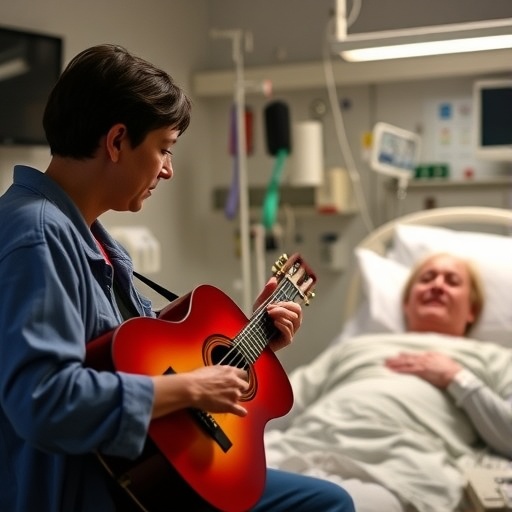In a groundbreaking clinical study set to be unveiled at the ACC Latin America 2025 conference in Mexico City, researchers have demonstrated that music therapy holds profound therapeutic potential in the management of critically ill patients in cardiac intensive care units (ICUs). This innovative research highlights how structured musical interventions can lead to significant reductions in physiological stress markers such as heart rate, blood pressure, and patient–ventilator asynchronies, which are often challenging complications in cardiac critical care.
Music therapy, distinct from passive music listening, involves the deliberate application of musical elements by certified music therapists to achieve targeted health outcomes. This modality represents a sophisticated, non-pharmacological, and non-invasive approach that modulates autonomic nervous system responses. It offers a complementary strategy that aligns with contemporary holistic patient-centered care paradigms by addressing biopsychosocial dimensions of health, including emotional regulation and cognitive engagement.
The study, conducted by a team led by Dr. Ilani Paola Santoyo Pérez at the University of Guanajuato, engaged 24 alert patients without auditory deficits admitted to a high-acuity cardiac ICU. Over a period spanning July to September 2024, participants were randomized into two cohorts: one receiving standard ICU care and the other exposed to a controlled music therapy protocol. The intervention comprised five consecutive days of 45-minute exposure sessions to specifically curated melodies delivered at a low sound intensity of 15 decibels, a level carefully chosen to avoid sensory overstimulation while still eliciting neurophysiological relaxation responses.
Physiological monitoring employed advanced metrics to measure heart rate variability, systolic and diastolic blood pressures, alongside precise quantification of patient–ventilator asynchronies—a phenomenon where patient breathing efforts are out of sync with ventilator cycles, which can exacerbate respiratory distress and prolong mechanical ventilation duration. Remarkably, the music therapy group exhibited statistically significant ameliorations across these domains, indicating enhanced autonomic balance and respiratory synchrony.
The implications of these results reverberate deeply within critical care practice. Heart rate and blood pressure modulation is a cornerstone in managing cardiac patients, as elevated sympathetic activity portends worse clinical outcomes, including arrhythmogenesis and myocardial ischemia. By attenuating sympathetic overdrive through music therapy, clinicians can potentially mitigate these risks without additional pharmacologic burden, thereby reducing polypharmacy and its attendant complications.
Furthermore, the reduction in patient–ventilator asynchronies underscores music therapy’s unexpected role in optimizing respiratory mechanics. Synchrony with mechanical ventilation improves oxygenation, decreases work of breathing, and fosters more efficient gas exchange. This physiological optimization may accelerate ICU weaning protocols and shorten lengths of stay, thereby easing resource utilization and improving patient throughput.
This therapeutic avenue aligns robustly with guidelines posited by the Society of Critical Care Medicine (SCCM), which advocate for integrative interventions promoting psychological well-being alongside conventional medical therapy. Music therapy’s incorporation into ICU protocols exemplifies a paradigm shift towards multidisciplinary modalities that recognize the interconnectedness of mind and body in healing trajectories.
Neurobiologically, music’s influence on the limbic system and hypothalamic-pituitary-adrenal axis contributes to its calming effects. Melodic structures elicit dopaminergic pathways linked to reward and relaxation, reducing cortisol secretion, which in turn lowers circulating catecholamines. The neurochemical cascade dampens systemic inflammation and modulates cardiovascular reflexes, fundamental mechanisms underpinning the observed clinical improvements.
The safety profile of music therapy is notably favorable, with no reported adverse events, marking it as a cost-effective intervention that requires minimal infrastructural investment. This positions music therapy as an accessible option globally, including in resource-limited settings where pharmacological interventions may be constrained by economic or logistical factors.
In summation, this study propels music therapy from an auxiliary wellness practice into the realm of evidence-based, clinical critical care science. Its capacity to harmonize physiological parameters crucial to cardiac patients expands the armamentarium of ICU therapies, offering a compassionate, patient-centered tool that reduces physical distress and enhances recovery potential.
As cardiac ICUs continue to evolve with technological advancements, integrating music therapy represents a holistic approach—melding technology with humanistic care—to address the multifaceted needs of critically ill patients. Future research directions are poised to explore mechanistic underpinnings with neuroimaging and biomarker analyses, assess long-term outcomes, and determine optimal musical genres and delivery modalities tailored to individualized patient profiles.
The American College of Cardiology (ACC), a leading institution committed to advancing cardiovascular knowledge and patient care innovation, endorses the integration of music therapy into standard ICU practices. This endorsement reaffirms the importance of multidisciplinary strategies in improving clinical outcomes while emphasizing low-risk, accessible interventions that complement existing treatments.
This study’s findings ignite a reimagining of therapeutic approaches within cardiac critical care, encouraging clinicians worldwide to adopt music therapy as a vital component of comprehensive patient management. By leveraging the intrinsic power of music, healthcare providers can foster environments that not only treat disease but also nurture healing and human resilience.
Subject of Research: The impact of music therapy on physiological variables and patient–ventilator asynchronies in cardiac intensive care unit patients.
Article Title: Not explicitly provided.
News Publication Date: Not explicitly provided, but the study was conducted between July and September 2024.
Web References:
- https://www.acc.org/latinamerica2025
- https://my.clevelandclinic.org/health/treatments/8817-music-therapy
- https://www.acc.org
Keywords: Psychological stress, Music, Cardiology, Blood pressure, Alternative medicine, Doctor-patient relationship, Emergency medicine, Health care delivery, Patient monitoring, Personalized medicine




